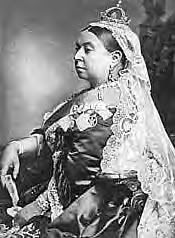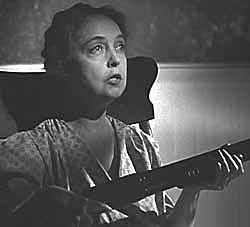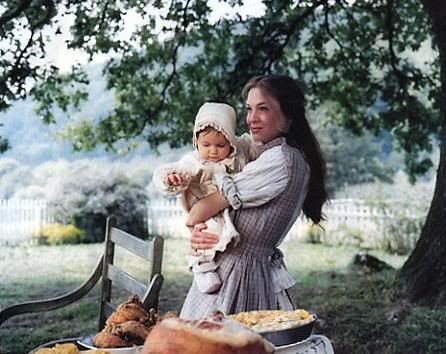 Granny Weatherall, the subject of my last post, is a fine example of the battleaxe, a certain forceful type of dowager who wields an incredible amount of power and respect both within their family and society. Although a bit gruff, dour and sharp tounged, a battleaxe is wise and highly sought after for advice on both family and financial matters. One can always count on them to set oneself straight.
Granny Weatherall, the subject of my last post, is a fine example of the battleaxe, a certain forceful type of dowager who wields an incredible amount of power and respect both within their family and society. Although a bit gruff, dour and sharp tounged, a battleaxe is wise and highly sought after for advice on both family and financial matters. One can always count on them to set oneself straight.From "The Jilting of Granny Weatherall":
She wasn’t too old yet for Lydia to be driving eighty miles for advice when one of the children jumped the track, and Jimmy still dropped in and talked things over: “Now, Mammy, you’ve a good business head, I want to know what you think of this?…
A battleaxe makes a fine, reassuring role model for young women. Why fear aging and loss of beauty and physical allure if you get to become a battleaxe? Unlike most elderly in this society, they’re not marginalized. They haven't subsumed themselves completely to a man like Nancy Reagan. They're not pitifully frightening like that plastic surgery victim/mutton dressed as lamb Helen Gurley Brown, a woman who prattles on about her sex life in her seventies, as if anyone would be interested in hearing about that. Battleaxes age gracefully and with dignity. They dress age appropriately and are often stout. In the South, they’re president of the charity clubs and arbiters of society rules and decorum. They possess the power to decide the social fates of young women, as Margaret Mitchell discovered when the old battleaxes blackballed her from the Junior League after she scandalized them by doing something called the Apache Dance at a debutante party. In Gone with the Wind, Rhett Butler knows that these women will determine whether his daughter Bonnie would be making her debut and in whose houses she will be received, so he begins paying court to them as soon as his daughter is in her pram. Gone with the Wind, like the South, is replete with battleaxes. I wrote about my favorite, Grandma Fontaine, a few years ago.
 Battleaxes are not necessarily part of white high society. African Americans have their versions of the archetype with Madea and Big Momma. In Night of the Hunter, Lillian Gish portrays Rachel Cooper, an old country widow who takes in and fosters stray children during the Great Depression. She’s gentle and nurturing but tough and sure of her place in the world. Surrounded by her adopted children she says, “I'm a strong tree with branches for many birds. I'm good for something in this world and I know it, too.” She protects the children during the all night stand off with Robert Mitchum's character, a psychopathic preacher who is pursuing two of the children. Knowing he is hiding somewhere on the porch, she rocks all night in a rocking chair, shotgun in her lap. Accustomed to staying up all night nursing sick children and holding deathbed and childbirth vigils, she patiently and stoically outlasts Robert Mitchum. When he can stand to wait no longer, he shrieks out of his hiding place and charges her. She shoots him and then calls the Sheriff. "You better get out here. I've got something trapped in my barn."
Battleaxes are not necessarily part of white high society. African Americans have their versions of the archetype with Madea and Big Momma. In Night of the Hunter, Lillian Gish portrays Rachel Cooper, an old country widow who takes in and fosters stray children during the Great Depression. She’s gentle and nurturing but tough and sure of her place in the world. Surrounded by her adopted children she says, “I'm a strong tree with branches for many birds. I'm good for something in this world and I know it, too.” She protects the children during the all night stand off with Robert Mitchum's character, a psychopathic preacher who is pursuing two of the children. Knowing he is hiding somewhere on the porch, she rocks all night in a rocking chair, shotgun in her lap. Accustomed to staying up all night nursing sick children and holding deathbed and childbirth vigils, she patiently and stoically outlasts Robert Mitchum. When he can stand to wait no longer, he shrieks out of his hiding place and charges her. She shoots him and then calls the Sheriff. "You better get out here. I've got something trapped in my barn."Catherine Mingott in the Age of Innocence is another grand battleaxe from literature. Her immense weight, which has prevented her from wrinkling or appearing to age, has also incapacitated her to the point where she never leaves her house. Although confined to her mansion, she wields incredible power and controls her social sphere and her family, which visit her like attendants to a queen bee. She is the standard and enforcer of propriety. My favorite scene is when her niece comes to her to beg her to give her money to prevent a financial scandal caused by her husband, "to back up her husband, see them through--not to desert them, as she called it--in fact to induce the whole family to cover and condone their monstrous dishonour." Catherine, who has the rectitude and ideals of a Roman matron, will hear none of it. "I said to her: "Honour's always been honour, and honesty honesty, in Manson Mingott's house, and will be till I'm carried out of it feet first... And when she said: `But my name, Auntie--my name's Regina Dallas,' I said: `It was Beaufort when he covered you with jewels, and it's got to stay Beaufort now that he's covered you with shame!"
 Squinty, prune faced Ruby Thewes from Cold Mountain, although too young to be considered a true battleaxe, is well on her way to becoming one. We are introduced to her when she walks up to the porch where the refined to the point of uselessness Ada is being held hostage by a tyrannical rooster. Ignoring Ada’s warnings, Ruby marches right up to the rooster and wrings his neck. “Let’s put ‘im in a pot.” Ruby is practical, self sufficient and tough. She whips the farm back into shape and saves Ada from starvation. Judging by the way Ruby's husband snaps to when she tells him to get the cider at the picnic at the end of the movie, the viewer knows that Ruby will make a fine battleaxe in years to come.
Squinty, prune faced Ruby Thewes from Cold Mountain, although too young to be considered a true battleaxe, is well on her way to becoming one. We are introduced to her when she walks up to the porch where the refined to the point of uselessness Ada is being held hostage by a tyrannical rooster. Ignoring Ada’s warnings, Ruby marches right up to the rooster and wrings his neck. “Let’s put ‘im in a pot.” Ruby is practical, self sufficient and tough. She whips the farm back into shape and saves Ada from starvation. Judging by the way Ruby's husband snaps to when she tells him to get the cider at the picnic at the end of the movie, the viewer knows that Ruby will make a fine battleaxe in years to come.

No comments:
Post a Comment